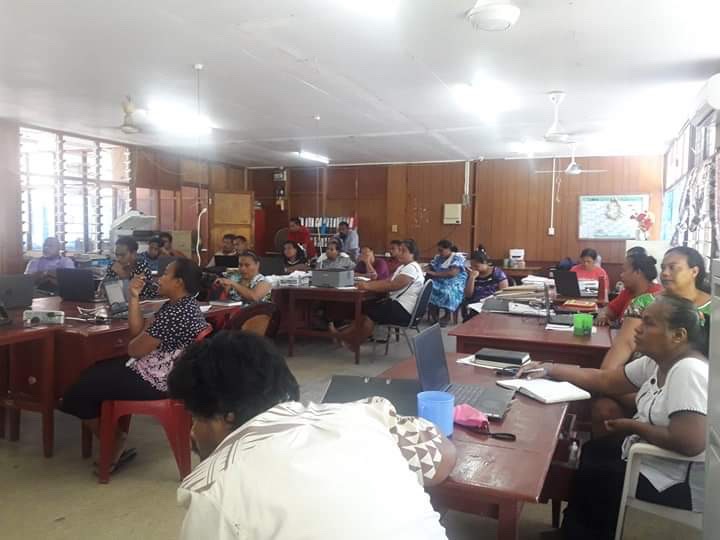Water lessons from PASAI's Secretary-General's Office
by Sarah Markley, PASAI’s Deputy Secretary-General
It was great to see everyone at our Annual Congress last month. The role of auditors – and Auditors-General – can be a lonely one, so it is excellent to connect with peers, to discuss our challenges and hear about the innovative ways PASAI members are dealing with them.
Sharing lessons and models is a sustainable and effective way to improve the impacts of our initiatives, which we can localise to suit the needs of our own countries. Our audits are just one of the tools we have – what we are seeking to do is build the trust and confidence of our people that our public sectors are accountable, and that our work is improving their efficiency and effectiveness.
We have learned a lot from the audit of preparedness to implement the UN 2030 Sustainable Development Goals undertaken by our Pacific neighbours. Hearing about the world-leading initiatives that SAIs across our region are doing in this area will inform our own activities in the future.
In this spirit, we would like to share with you some examples of reports our office has tabled recently, as we complete a suite of performance audits considering issues related to water management in New Zealand. We are constantly studying the initiatives of others, and testing and refining our own – and we are more than happy to share our knowledge.
Auditing water management: a theme-based approach
One of the challenges we are facing more and more is how to audit complex and interconnected systems beyond the financial aspects of individual entities, into the performance, outcomes, governance, and effectiveness of whole sectors. This was a factor we considered in doing a major, multi-year programme looking at water management.
We are still learning how to do this most effectively. However, our initial attempts have shown not just how well our planning pieced the puzzle together, but also the pieces we’re missing.
Some of the work we have done to explore this theme so far includes:
Managing stormwater systems in New Zealand
Flooding is New Zealand's most frequent natural hazard. Climate change and increasing urbanisation are expected to increase the risk of flooding in the future. In this audit, we looked at how three councils managed their stormwater systems to protect people and their property.
We found all councils had an incomplete understanding of their flood risk, gaps in their understanding of their networks’ current state, and were potentially underinvesting in renewing their assets.
You can see our report here https://oag.govt.nz/2018/stormwater.
Marine planning for the Hauraki Gulf:
The Hauraki Gulf/Tīkapa Moana is one of the busiest marine areas in New Zealand. Each year, the Gulf generates more than $2.7 billion in economic activity. Used for boating and recreational, commercial, and customary fishing, it’s important both for people living there, and the region's tourism industry.
Community stakeholders and government agencies worked together to create New Zealand's first marine spatial plan, for a healthy, productive, and sustainable future for the Gulf. Finalised in December 2016, the project was a successful example of a stakeholder-led collaborative approach, with general support from those who prepared it. However, the plan is not easy for the central and local government agencies to implement, and those involved in the project are frustrated at the lack of progress.
You can see our report here https://oag.govt.nz/2018/hauraki
Protecting marine environments
We looked at how two groups used two different processes that generated advice to Ministers for establishing marine protection, including marine reserves. We examined how inclusive, transparent, and well informed the processes were to identify lessons that could be applied to support the establishment of other marine protection measures.
Through this, we found that aspects of the implementation guidelines are too restrictive, and called for Government to consider reforming marine biodiversity protection legislation, policy, or planning to support greater collaboration, to better protect New Zealand’s unique marine biodiversity.
You can see our report here https://oag.govt.nz/2019/marine-environment
How water is used for irrigation
In 2010, the New Zealand Government regulated how big water users track their water use. We audited how these had been implemented by the six councils responsible for 90% of freshwater irrigation used in NZ.
Through this audit, we found not only that councils had mostly implemented these effectively, as required by law, but that some had gone beyond the basic requirements, using smart metering to collect information to improve how they maintained their network, scheduled water use promotions, and charged service users.
You can see our report here https://oag.govt.nz/2018/irrigation
****
These audits represent some of our work programme to improve trust and promote value within New Zealand’s public entities, for the good of our communities. I hope these examples are useful to you – and we are happy to discuss, support, and exchange ideas to build a prosperous and stable Pacific, with effective and fair public systems, and good governance for our organisations.


















